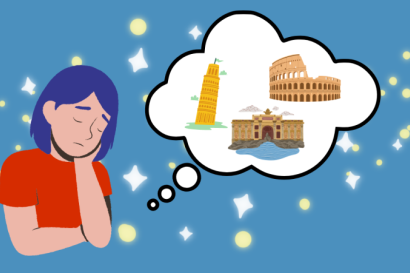Being human means having preconceived notions and ideas, it’s simply a part of life. This means that stereotypes and clichés are a real part of traveling and experiencing new cultures.
Before I began my study abroad program in Rome, I had the privilege of visiting some new countries in Europe and learning more about what makes each country unique and special.
As an American, there are a number of clichés and stereotypes that get tacked onto our identities. The first day of orientation I learned that American students are considered loud by Italians. The first night out to dinner with new friends gave me all the confirmation that I needed.
In each country I visited, I was able to encounter new people, cultures, and social standards. I learned a lot about each country’s customs, which forced me to step back from the stereotypes I subscribed to and experience each city without bias.
Here are some of the stereotypes about the countries I visited and how they held up in reality.
Amsterdam, The Netherlands
The first city I visited on my tour of Europe was Amsterdam. Besides watching the tear-jerking experience that was The Fault in our Stars in 2012, I had no idea what to expect.
In preparation for the trip, I did some research. Rumor had it that everyone in Amsterdam wore clogs and rode bicycles in a progressive city with next to no restrictions.
Come to find out, the bike stereotype is true. Amsterdam actually boasts more bikes than residents (true fact). However, the only time I saw clogs was on the wall of my hotel room.
And the city is beautiful and clean. I was blown away by the lack of litter and the outdoor vacuums that were being used at all hours to clean up the streets.
The laws in Amsterdam were also much more lenient than I expected. There are a lot of decriminalized actions in Amsterdam, but you can’t necessarily go about doing whatever you want. Nonetheless, it was an interesting dynamic to experience.
Paris, France
I found myself in Paris next, wondering if the French are actually rude to Americans, and how commonplace are croissants on a day-to-day basis?
Yes, croissants are everywhere. But no, the French aren’t rude. In fact, I encountered some of the nicest shop owners and waiters in France.
What I found interesting in France was the diversity of the city. There were plenty of cultures and nationalities represented despite the stereotype that the French cherish their culture above all else.
National pride exists, but so does inclusion and representation in the City of Lights.
Munich, Germany
Munich was a last minute decision, but I’m so glad I could make it work. German culture is one of my favorites, and it didn’t disappoint.
Germans can sometimes play into their stereotypes, something that helps tourism and sales. I often saw waitresses in dirndls (the traditional German dresses with puffed sleeves and aprons). But they weren’t casually sported by locals in the streets.
Beer, schnitzel, and bratwurst were, of course, readily available, but so were other cuisines.
Another stereotype was the notion that Germans are rule-followers. I noticed a few social norms that led into this idea: no one jaywalks or speaks loudly indoors.
It’s easy to consider Germans rule-followers in their more reserved social standard, but Germany was as warm and welcoming as every other European country.
Salzburg, Austria
Salzburg was a must-see for me. Having friends study abroad in Salzburg gave some idea of what to expect during my short trip in the city.
I imagined a small town with a close-to-similar German heritage. Therein lies the first stereotype: that Austria is no different than Germany.
Austria and Germany share a lot of similarities, but they are distinct in customs, greetings, and culture. And they definitely don’t live each day as if they’re in The Sound of Music.
Rome, Italy
My final destination was Rome, The Eternal City, where I would live for another 6 weeks.
During all of my research and preparation to study abroad, I spent the most time understanding Rome and its culture.
Some stereotypes surrounding Romans include being friendly and affectionate, eating pasta every day, and speaking with their hands.
Italians are an incredibly friendly group, that’s no lie. And pasta is, of course, everywhere. But so is an abundance of other classic Italian recipes (sans carbs). I couldn’t foresee the extent of Italian food until I truly experienced Rome.
And we’ve all seen the classic Italian gesture (all fingers touching and aimed at the sky, you know the one). Well, it is a common gesture. This stereotype is in fact based in reality since Italians love to talk with their hands, a practice that is both endearing and amusing.
Rome not only lived up to my expectations, it exceeded them.
Closing thoughts
At the end of the day, stereotypes can either be good or bad. They’re based on experience, but oftentimes can outlast reality.
It’s important to have an open mind while traveling to make sure that you truly experience the diversity that every culture has to offer and don't get too caught up in your opinions that may not always end up being factual.

Chiara Profenna
<p>Ciao, my name is Chiara and I'm a rising senior at the University of Portland studying English, computer science, and education! I work as a news reporter on my campus newspaper (and will soon be an editor as well). I am extremely excited to be studying abroad in Rome, Italy this summer and I can’t wait to gain experience and share my journey for others while doing what I love: writing.</p>








